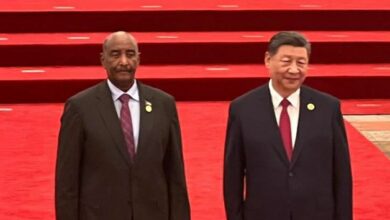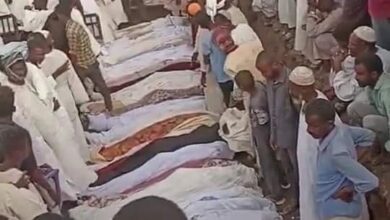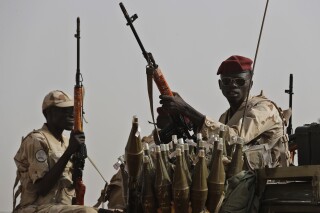
Rwanda Diplomatic Mission in Sudan Commemorates 28 years of the Tutsi Genocide
Staff Writer
Khartoum, Sudan – 12th May 2022 — On 12th May 2022, Rwanda Diplomatic Mission in Sudan in collaboration with the Rwandan Community in Sudan, Members of the Diplomatic Corps, Civil Society, Academicians, representatives of the host Government, Business Community, Friends of Rwanda and the Media fraternity in Sudan, held the 28th Commemoration of the 1994 Genocide against Tutsi in Rwanda. The event was held at Al-Salam Hotel in Khartoum with a total of about two hundred fifty (250) people. The Government of Sudan was represented by H.E Ambassador Elzein Ibrahim Hussein the Acting Director-General of the Department of Africa at the Ministry of Foreign Affairs of Sudan.
Themed “Remember-Unite-Renew”, this year’s commemoration is once again another time to pay tribute to the more than one million innocent lives lost through the atrocious and well-planned extermination of Tutsis in Rwanda twenty-eight (28) years ago.
The event started by playing both National anthems, a minute of silence in remembrance of the over one million killed during the Genocide, and lighting the flame of hope as a symbol of resilience and hope for future generations. A video of testimony by one of the Genocide Survivors was screened and later after the main remarks of the day, a video showing the progress Rwanda has registered 28 years since 1994 was shown to the audience. The main speakers for the event were the Guest of Honor and representative of the Host country as well as the Head of the Rwanda Diplomatic Mission in Sudan.
Mr. Buhungu Abel, the Head of Rwanda Diplomatic Mission in Sudan, thanked and welcomed H.E Ambassador Elzein Ibrahim Hussein for gracing the event. He extended warm thanks to the Excellences, Members of the Diplomatic Corps, Regional & International Organizations, friends of Rwanda, and fellow Rwandans for honoring the invitation for the event.

In his remarks of the day, Mr. Buhungu reminded the audience that 7th April was designated as an International Day of Reflection on the Genocide against Tutsi in 1994 in Rwanda by the UN Resolution 72/550 of 26th Jan 2018 and that relatedly the day is also the African Union Day of Commemoration of the Genocide against Tutsi in Rwanda according to African Union Assembly decision /AU/Dec.695 of July 2018.
He narrated the historical facts of pre-colonial Rwanda, where he said it existed as a Nation-State for over five hundred years with Rwandans living harmoniously together without any inter-communal violence. He informed the audience that Rwandans have an identical culture and language and before the advent of colonialists all shared the same values.
He recalled the malicious colonial policy of divide and rule which led to the issuance of ethnic-based National Identity Cards (NIDs) back in 1932 thus turning what were originally social classes into ethnic groups of Twa, Hutu, and Tutsi. He contended that unfortunately these NIDs were later used in identifying Tutsi in the institutionalized discrimination and recurrent killings leading up to the climax of the 1994 Genocide against Tutsi when roadblocks were mounted to identify those to kill.

He added that in 1957 the Colonial administration sponsored the drafting and adoption of the Hutu Manifesto with ten Hutu Commandments initiated by one Joseph Habyarimana and passed in 1959. Relatedly, two main Hutu extremist political parties were birthed out of this same ideology of hate and discrimination against Tutsi: Party for Hutu Emancipation (PARMEHUTU); and APOROSOMA, whose leader was the drafter of the notorious Ten Hutu Commandments. As an example he argued, one of these ten Hutu Commandments stated that: “no Tutsi should be trusted, loved or valued in any way”.
These ten Hutu Commandments were the foundation for the genocide ideology whose later objective was the total extermination of Tutsi. Escalation of this extremist vision and the worst form of violence was thanks to the two post-independence republics of 1962 and 1973, Mr. Gregoire Kayibanda and Juvenile Habyarimana, respectively. Both of these leaders indoctrinated Rwandans with hate against Tutsi to the extent of turning over a million of them stateless for over thirty years while others inside the country were subjected to cyclic killings or at the least were relegated to second class citizens before a final plan was orchestrated to exterminate all. Indeed, within Just only 100 days from 7th April to 4th July 1994, over a million innocent souls were butchered, he said.
Absurdly, when the genocide began, the UN ordered an immediate partial withdrawal of its MINUAR forces from 1,700 to only 270 soldiers – a number that could only observe the carnage, he said. Amid this rampage and carnage, the RPF was left with no alternative but to launch a military campaign to stop Genocide and save lives, piloting a new chapter of stability, which Mr. Buhungu approved.

Mr. Buhungu commended RPF young men and women under the capable leadership of President Paul Kagame, who took up the mantle of ending the genocide. Many of those involved in this liberation struggle paid their ultimate price. We cannot thank them enough for stopping the genocide, ending the state of statelessness of over a million refugees, and bringing sanity back. Their sacrifice was not in vain – we remember them with reverence, he complimented.
Mr. Buhungu thanked the growing number of countries that are contributing to fighting genocide-related impunity by apprehending genocide fugitives for trial either in Rwanda or in their jurisdictions of abode. He however noted that over one thousand indicted genocide fugitives still freely roam the globe and requested host countries to arrest them for trial in observance of UN and AU resolutions as well as making the Never Again aspiration a reality.
After the liberation struggle, the RPF invited politicians from the old regime with no known role in the genocide and formed a Government of National Unity. This new Government tackled many challenges, not least: (i) promotion of national unity and reconciliation of Rwandans; (ii) repatriating refugees herded into exile in eastern Congo by genocidal forces for replenishment of their forces; (iii) supporting vulnerable genocide survivors; (iv) fighting insurgency of the late 1990s to early 2000s; (v) fighting genocide ideology and its related impunity; (vi) rehabilitating Rwanda’s image, and (vii) salvaging a devastated economy. Now, twenty-eight years after the genocide, Rwanda has been rebuilt beyond all expectations. It is both politically and socially stable and in her contribution to global peace, it is one of the major troop-contributing countries to UN Peacekeeping Missions on the continent and beyond, Mr. Buhungu elaborated.

On Rwanda’s Economy, he said it grew at an average of 8% for 16 consecutive years until the outbreak of COVID19 in 2020. With close to 70% of Rwandan residents now vaccinated and related full reopening of economic activities, the economy which shrunk by 3.4% in 2020 has rebound with a 10.2% growth in 2021, the Head of Mission said.
Relatedly to the Government’s effective management of the COVID19 pandemic, Mr. Buhungu reminded us that Rwanda will be hosting the Common Wealth Heads of Government (CHOGM) this June and urged all CHOGM Members to attend this very vital meeting assured of a very safe stay in a serene environment and a results-packed Summit.
The Head of Mission commended the people and Government of the Republic of Sudan for their continued friendship and cooperation. He emphasized that the growing bilateral relations between Rwanda and Sudan are rooted in shared values, and supported by signed MoUs as well as Agreements in areas of mutual interest. He cited the visit to Rwanda of Lt-General Ibrahim Jabir Ibrahim as a Special Envoy of Lt-General Abdel Fattah Al-Burhan to H.E President Paul Kagame, on 30th March this year as a testimony to this mutually valuable relationship. He asked Sudan-based investors & tourists to visit and explore the enormous opportunities offered by Rwanda for the mutual benefit of both countries and peoples.
The Guest of Honor H.E Ambassador Elzein Ibrahim Hussein expressed his pleasure in addressing the audience on behalf of the Government of Sudan, on the occasion of this solemn observance of the twenty-eighth Commemoration of the Genocide Against the Tutsi of 1994 in the sisterly Republic of Rwanda, that horrific event which is a period of only one hundred days, claimed the lives of over a million people, most of whom were Tutsis and moderate Hutu.

There is no doubt that commemoration is to hail the memory of the victims’ pain and mourning for the souls of mothers, fathers, sons and daughters, friends and relatives whose blood was spilled without any crime.
On this anniversary, we renew the covenant with the principle of impunity, the rule of law, respect for human rights, and the formation of the institution entrusted with doing so, in addition to freedom of opinion, change, and social justice.
I affirm Sudan’s sincere desire to strengthen cooperation with the Republic of Rwanda to achieve national reconciliation and the economic well-being of our people and the peoples of the region. Wisdom is the stray of the believer.
We applaud the Rwandan leadership for healing the wounds of the past and working towards the success of civil reconciliation and the prosecution of the perpetrators of crimes.




